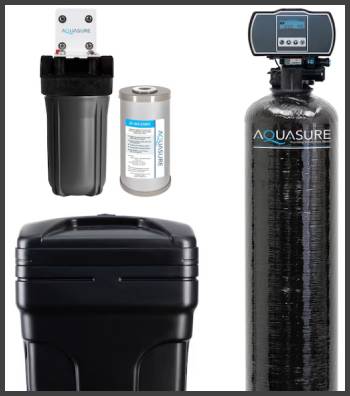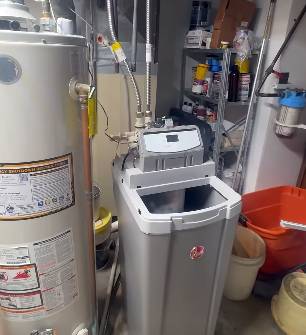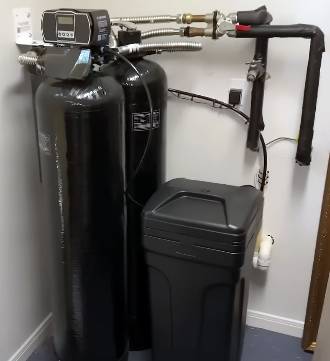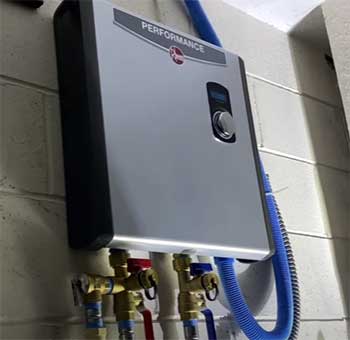When I started my hunt for a water softener, two brands kept popping up: Aquasure and Rheem.
So, I decided to get hands-on with both to see which one really makes your life easier.
In this article, I’m laying it all out for you—performance, features, ease of use, and long-term value.
If you’re stuck choosing between Aquasure and Rheem, you’ll want to keep reading.
Aquasure Vs. Rheem Water Softener: Quick Comparison Table
| Feature | Aquasure Water Softener | Rheem Water Softener |
| Grain Capacity | 32,000 to 64,000 grains | 30,000 to 48,000 grains |
| Iron Removal | Up to 10 ppm | Up to 8 ppm |
| Water Flow Rate | Up to 15 GPM | Up to 11 GPM |
| Control Head | Digital, programmable | Digital with simple LCD |
| Installation | DIY-friendly with support videos | Professional or semi-pro recommended |
| Warranty | 5 years (tank), 1 year (parts) | 1 year standard |
| Price Range | Affordable to mid-range | Mid-range |
| Made In | USA | Mostly assembled in Mexico/USA |
My Real Experience Using Both

I installed Aquasure in my brother’s house and Rheem in my own to compare them side-by-side. From setup to everyday use, I lived with both systems and got to know their quirks and strengths.
Let’s start with Aquasure. Right out of the box, the packaging was intuitive and well-labeled.
It included clear instructions, and we even found a few tutorial videos online which made the DIY setup manageable. Within two hours, we had the unit plumbed in and regenerating.
The water felt different almost immediately. Softer, smoother, and showers were noticeably better.
Dishes didn’t have those annoying white spots anymore. What I really appreciated was how much control the digital valve gave us.
You could fine-tune the regeneration cycles, salt usage, and flow settings based on your needs.
Now, about Rheem. The setup wasn’t as smooth. It’s not impossible to install yourself, but it did take me longer—closer to four hours.
The manual was basic, and I had to call support for clarification a couple of times. That said, once up and running, it delivered solid results.
Water felt softer within a day or so, and laundry came out cleaner and fluffier. But I did notice Rheem regenerated a bit more frequently than Aquasure, which meant more salt usage over time. The unit itself looks modern, and the LCD interface was easy to navigate.
Over a few months, Aquasure seemed to outperform slightly in terms of water pressure and efficiency.
I tracked water usage, salt use, and grain handling. Aquasure was just more consistent, especially in high-usage households like mine.
That said, Rheem has its strengths. It’s a trusted brand with a strong presence in the water heater and plumbing industry.
Replacement parts are easy to find. But if you’re aiming for value and efficiency in one unit, Aquasure pulls ahead.
Salt Usage Over Time
Tracking salt usage over several months gave me a clear picture of how these systems perform in the long run.
Aquasure was the standout here. On average, I was refilling the salt tank once every five to six weeks, which felt like a sweet spot for low maintenance and long-term cost savings.
Rheem, in comparison, needed a top-up closer to every three to four weeks.
This may not sound dramatic, but think about the hassle and expense over a full year. That’s at least three or four fewer 40-pound salt bags I didn’t have to lug in and dump into the tank.
If you’re not a fan of hauling salt or you have physical limitations, those extra trips really add up. Over time, Aquasure’s more efficient regeneration cycle pays off.
Also, I noticed that Aquasure didn’t regenerate as often as Rheem. It seemed smarter in how it managed water softening, only triggering a cycle when really needed.
Rheem tended to follow a fixed pattern that didn’t adapt as well to actual water usage, especially in weeks when we used less water.
For larger households or anyone trying to minimize upkeep, Aquasure’s lower salt demand is a clear benefit.
It saves money, time, and effort. Plus, using less salt is just better overall for the environment and your plumbing.
If you’re focused on the long game—total ownership cost and convenience—salt efficiency is one of those behind-the-scenes factors that makes Aquasure shine more than you might expect.
Water Quality and Feel

When it comes to water softeners, performance isn’t just about specs—it’s about how the water actually feels and works in your day-to-day life.
That’s where I noticed a tangible difference between Aquasure and Rheem.
Aquasure gave me what I’d call a silky water experience. From the first few showers, the change was obvious. Soap and shampoo lathered effortlessly.
My skin didn’t feel as dry afterward, and my hair felt smoother—even without conditioner. The water just felt more refined, almost like something you’d expect at a spa.
That softness extended to the laundry too. Clothes came out softer, and the colors looked more vibrant after just a few washes.
With Rheem, there was definitely a difference compared to untreated hard water. Showers were better, and soap rinsed off easily.
But the water didn’t have that same luxurious feel Aquasure delivered. It was softer, but not quite as consistent or noticeable.
There were times when I wondered if the Rheem system was starting to regenerate too late, especially after heavy weekend water use.
When I checked on the dishes, both systems reduced those annoying white spots.
However, Aquasure’s water left the glassware just a bit clearer and streak-free.
It’s a subtle detail, but when you see it every day, it makes a lasting impression.
If water quality and overall feel matter to you—and let’s be honest, they should—Aquasure consistently felt like it was delivering a better experience.
That extra polish in everyday tasks makes a difference you can feel.
Performance With Well Water
Well water comes with its own unique challenges—iron, sediment, and varying hardness levels.
That’s why I paid close attention to how both Aquasure and Rheem handled our well water setup. Right away, Aquasure took the lead.
Aquasure is rated to handle iron levels up to 10 parts per million (ppm), which is a big deal in my area.
We’ve got moderately high iron content that can fluctuate seasonally. Before installing a softener, I had stains in the toilet bowls and rust marks in the dishwasher.
Once Aquasure was up and running, those problems started fading fast. It didn’t just soften the water; it actually helped keep appliances and fixtures clean longer.
Rheem, on the other hand, is only rated for up to 8 ppm. While it managed well under normal conditions, there were a couple of weeks where our iron levels spiked.
That’s when I noticed reddish streaks creeping back into the tub. The system just didn’t handle those peak levels as efficiently.
Another advantage with Aquasure was its built-in sediment filter. Well water often comes with grit or sand, and Aquasure seemed better equipped to deal with it.
The unit stayed cleaner, and I had to intervene less often.
In my experience, Aquasure clearly caters more to well water users. It gives that extra cushion of performance for when water conditions change—which they do.
If you rely on a private well and need consistency, Aquasure provides more peace of mind with less maintenance stress.
Ease of Maintenance and Monitoring
Aquasure’s digital display makes it super easy to monitor the system. I could check regeneration cycles, salt levels, and flow rate all in one place.
Rheem’s LCD was helpful, but a bit more basic. If you like to stay on top of your appliances, Aquasure gives you more info at a glance.
Maintenance for both was manageable, but I had to clean the injector screen on the Rheem a bit more often.
Also Read: My Thoughts On Culligan Water Softener
Pros and Cons of Aquasure Water Softeners

Aquasure Water Softener Pros:
- Higher grain capacity models available for larger households
- Handles iron levels up to 10 ppm
- Stronger water flow rate at up to 15 GPM
- Customizable settings via digital control head
- Excellent performance for well water and municipal water
- More efficient salt usage over time
- DIY-friendly setup with solid support documentation
- Made in the USA
- Better warranty coverage on tanks
- Competitive pricing for premium features
Aquasure Water Softener Cons:
- Control head has a slight learning curve
- Tank size may be bulky for tight spaces
- Limited availability at major retailers
- Not ideal for users wanting plug-and-play simplicity
Rheem Water Softener Pros and Cons

Rheem Water Softener Pros:
- Simple interface with LCD readout
- Easy to find at big box retailers like Home Depot
- Strong brand backing and availability of parts
- Reliable basic softening performance
- Sleek, compact design fits most utility closets
- Handles moderate iron levels well
- Durable build quality
- Affordable entry-level options
- Offers hybrid softener-filter units
- Good for small to mid-sized households
Rheem Water Softener Cons:
- Slightly lower grain capacity
- Regenerates more frequently, increasing salt usage
- Less customizable than Aquasure
- Support is hit or miss depending on retailer
- Control head feels less premium
- Limited warranty compared to competitors
- Flow rate not ideal for larger homes
- No advanced filtration features included
- Lacks app integration or smart features
- Not made entirely in the USA
Also Read: My Thoughts On Morton Water Softener
Frequently Asked Questions (FAQs)
Yes. Aquasure systems offer great performance, especially for homes with high water usage or iron-rich well water.
It depends on your needs. Aquasure offers better control and value, while Rheem provides solid basic performance.
With proper maintenance, they typically last 10 to 15 years.
Yes, Aquasure is designed and assembled in the USA.
Final Thoughts
If you want the most efficient, customizable, and cost-effective water softener that performs well for both well and city water, go with Aquasure.
If you prefer a basic, easy-to-find, and brand-backed model with decent reliability and simplicity, Rheem will work just fine.
Personally, I found Aquasure to be the better value. Its stronger flow rate, better control, and efficient salt use made a clear difference in daily comfort and utility bills.
